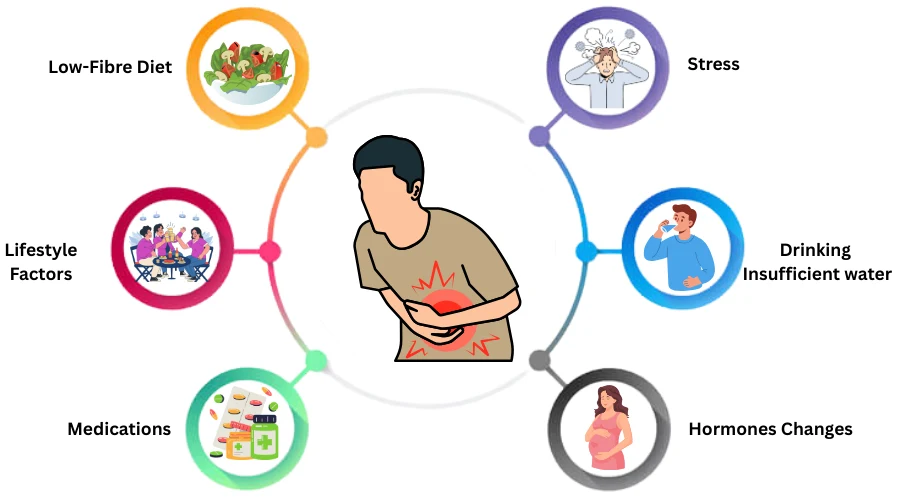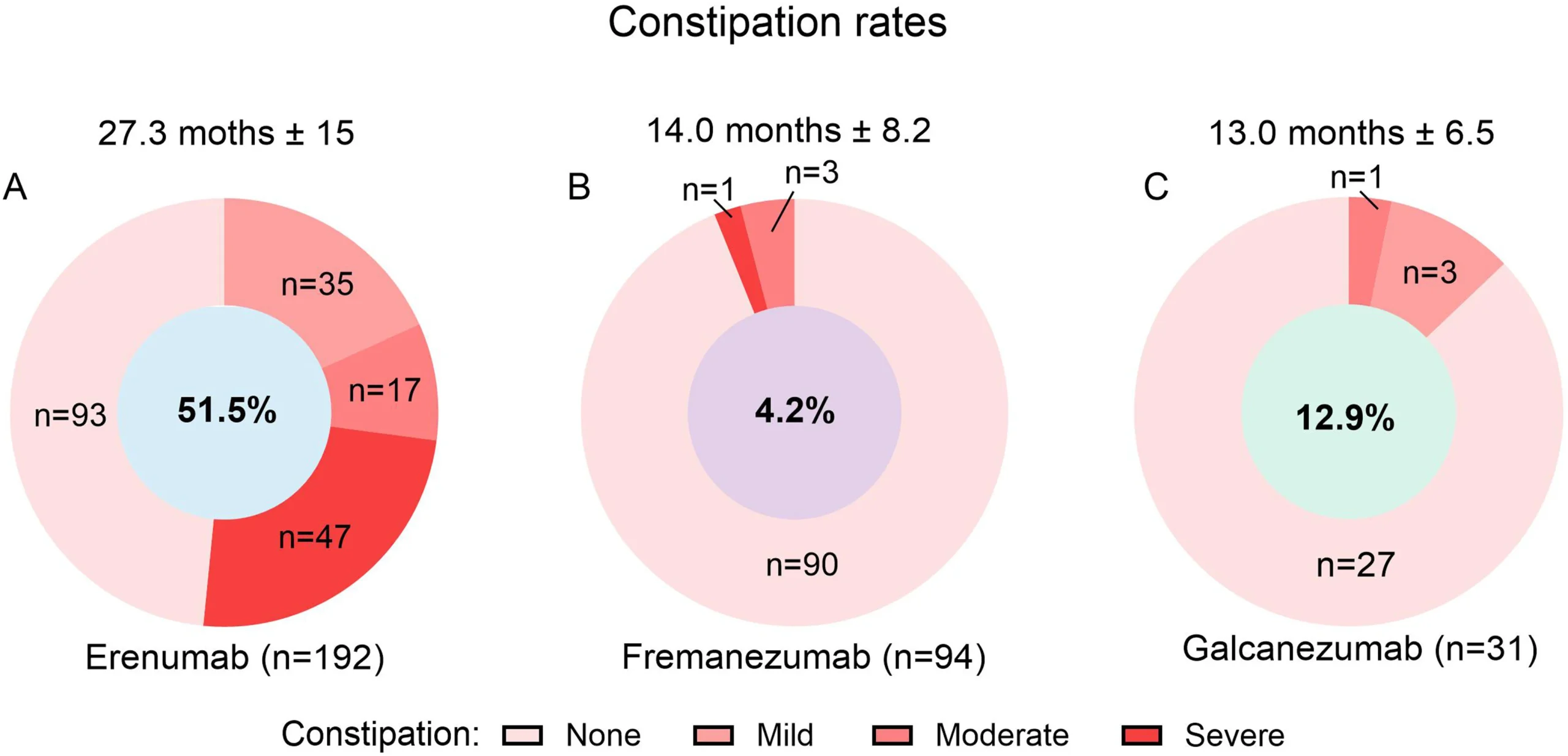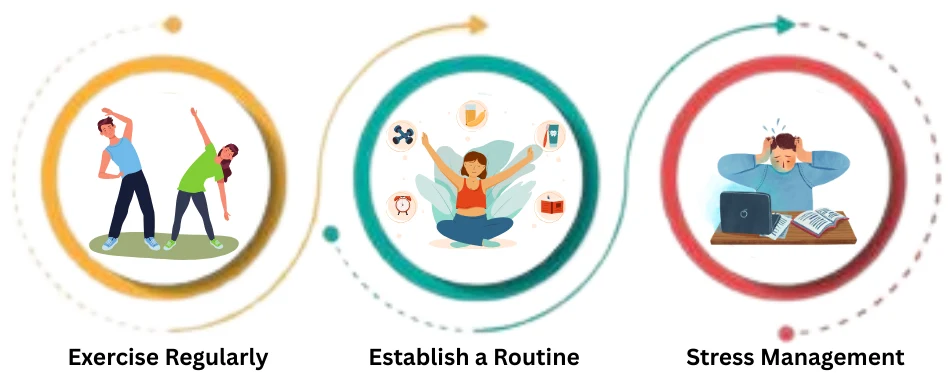Sorry, nothing in cart.
Constipation means having infrequent or hard bowel movements. It’s often due to low fiber intake and not enough activity. Dehydration can also cause it. In some cases, it is often linked with headache and dizziness. This condition can also come from shared factors. These include dehydration, lack of nutrients, toxin build-up from holding stool too long, or straining when you go to the bathroom.
All of these can impact your flow of blood. All it requires is to stay hydrated, eat a fibre-rich diet, and be physically active, which can help overcome constipation.
Research shows that constipation can trigger headaches. Dizziness may also share this common cause. A 2015 study showed that 25% of kids and teens with tension-type headaches also had constipation. Therefore, research depicted that improving constipation can improve headaches. In some cases, these symptoms may also affect a person’s overall well-being, similar to how Erectile Dysfunction (ED) impacts men’s quality of life. Just as treatments like Cenforce or Vidalista address ED effectively, proper constipation management can restore comfort and daily functionality.
What Exactly Is Constipation?
Constipation is a condition that causes individuals to suffer from infrequent, difficult, or incomplete bowel movements. If you undergo difficulty more than 3 times, then this can result in a high fever.
Symptoms of constipation
Infrequent bowel movement
Individuals who are facing fever than 3 bowel movements per week. Moreover, in chronic constipation, it may be less than once per week.
Lumpy stools
Stool in this condition may become dry and also pebble-like. This mainly happened because the colon absorbs too much water when stools stay in it for a longer time.
Straining at the time of bowel movements
While passing stools, patients need to put more effort than usual. This may cause vein swelling in the rectal area.
Pain in abdominal
Patients feel pain, bloating, and a cramping sensation in the abdomen. Sometimes this is accompanied by gas.
Excessive gas
Stool can slow down the digestion and cause gas build-up. However, bloating can make your abdomen feel tight and swollen.
Common causes of constipation
Intake of a low-fibre diet
If you are taking a low-fiber diet, then you can face difficulty. Hence, consider consuming fibre-rich food, including green vegetables, whole grains, and fruits.
Lifestyle factors
Lack of physical activities, and hence, it is advisable to include some of the exercises and avoid irregular schedules.

Medical conditions
Some of the medical conditions, like Irritable Bowel Syndrome, Hypothyroidism, Diabetes, Neurological disorders, and even intestinal obstruction, can also lead to difficulty.
Medications
Some of the painkillers, iron supplements, antidepressants, Antacids, Antihistamines, and Blood pressure medications.
Stress
Chronic stress can disrupt normal digestive processes, slow bowel movements, and lead to constipation.
Drinking insufficient water
Not drinking enough fluids can make stools hard and difficult to pass. Staying hydrated is essential for smooth digestion.
Changes in hormones
Changes in hormones occur during pregnancy and also during menopause. These conditions can also lead to constipation.These underlying health conditions and this covers irritable bowel syndrome or hypothyroidism.
Constipation as a possible predictor of poor treatment response in chronic migraine
Untreated constipation can turn into a serious digestive problem, researchers say. It can influence how patients with chronic migraine respond to treatment. Chronic migraine happens when headaches occur 15 or more days each month for over 3 months. It is often related to gastrointestinal symptoms.
Constipation in migraine patients can signal changes in gut motility. It may also indicate imbalances in the microbiome or systemic inflammation. All these factors can affect how well medications are absorbed.
Prevalence and demographics affected by constipation
This image shows the constipation rates in chronic migraine patients. It compares three different medications.

Erenumab has the highest rate of constipation, with 51.5% affected. This includes cases from mild to severe. Galcanezumab at 12.9%, and Fremanezumab at 4.2%. Constipation happens more often with Erenumab than with the other two treatments.
The Link Between Constipation and Headaches
How constipation can lead to headaches
Dehydration
An inadequate fluid intake can cause hard stools and slow bowel movements. This also reduces blood flow and oxygen supply to the brain, triggering headaches.
Tension and stress
Straining at the time of bowel movement, along with discomfort of constipation, can also create muscle tension. This is particularly in the neck and head area.
Hormonal changes
Changes in hormone levels and that is mainly in the menstrual cycle or even in thyroid issues that can slow the digestion process. This may lead to constipation and headaches.
Types of headaches associated with constipation
Tension headaches
One of the most common problems is a headache linked with constipation. Prolonged bowel issues can cause strain, discomfort, and muscle tension. This can spread to the head and neck, leading to dull, pressure-like pain.
Migraines
Constipation can cause or make migraines worse. This happens due to dehydration, slow gut movement, and inflammation in the body. Chronic migraines and constipation may signal deeper imbalances. These issues can lead to more frequent attacks and make treatment harder.
How can constipation cause dizziness?
Constipation causes dizziness based on the combination of physiological and lifestyle-related factors. Frequent bowel movement can lead to difficulty and irritation in the end. This tension impacts blood circulation and oxygen flow, leading to lightheadedness.
Dehydration can cause constipation. This may lower blood pressure and reduce fluid balance, which can lead to dizziness.
Conditions With Both Headaches and Constipation
Irritable Bowel Syndrome (IBS)
Irritable Bowel Syndrome (IBS) often causes constipation, abdominal pain, and bloating. This, in turn, can lead to headaches and other difficulties.
Fibromyalgia
Fibromyalgia is a condition that is characterized by fatigue and pain, and often disrupts bowel movement.
Celiac Disease
People with celiac disease have an immune response to gluten. This can cause chronic constipation and nutrient shortages. These issues may lead to headaches and migraines.
Mood Disorders
Disorders such as depression or anxiety can also impact bowel movement and are related to mood disorders. They can also tighten muscles. This adds to the symptoms of these conditions.
Chronic Fatigue Syndrome
This is known as the ongoing tiredness. It also brings neurological and stomach issues. As a result, headaches and constipation often occur together.
Symptoms to Monitor
At the time you are experiencing both headache and constipation, it is advisable to monitor some symptoms like-
Treatment and Management
Addressing constipation-related headaches and dizziness requires a combination of lifestyle adjustments, dietary improvements, and, when necessary, medical interventions.
Dietary Modifications
Lifestyle Changes

Medical Interventions
If constipation is linked to conditions like IBS, hypothyroidism, or celiac disease, treating the root cause is essential for long-term relief.
Consult your healthcare expert
Undergoing difficulty like a headache and constipation, then it is advisable to reach a doctor. They will conduct a complete examination and identify the underlying cause. This can help rule out serious conditions. Then, they will guide you to recommend the right treatment.
Conclusion
Constipation and headaches are often linked. Dehydration, stress, and some health issues can cause both. Knowing this link can help you take precautions. Make sure you eat a healthy diet and drink plenty of water. However, if symptoms last for more days, then it is advisable to seek medical expert advice. And for men balancing digestive concerns with ED, solutions like Kamagra oral jelly and Fildena from trusted suppliers like Actiza Pharmacy can offer reliable results and improved well-being.
